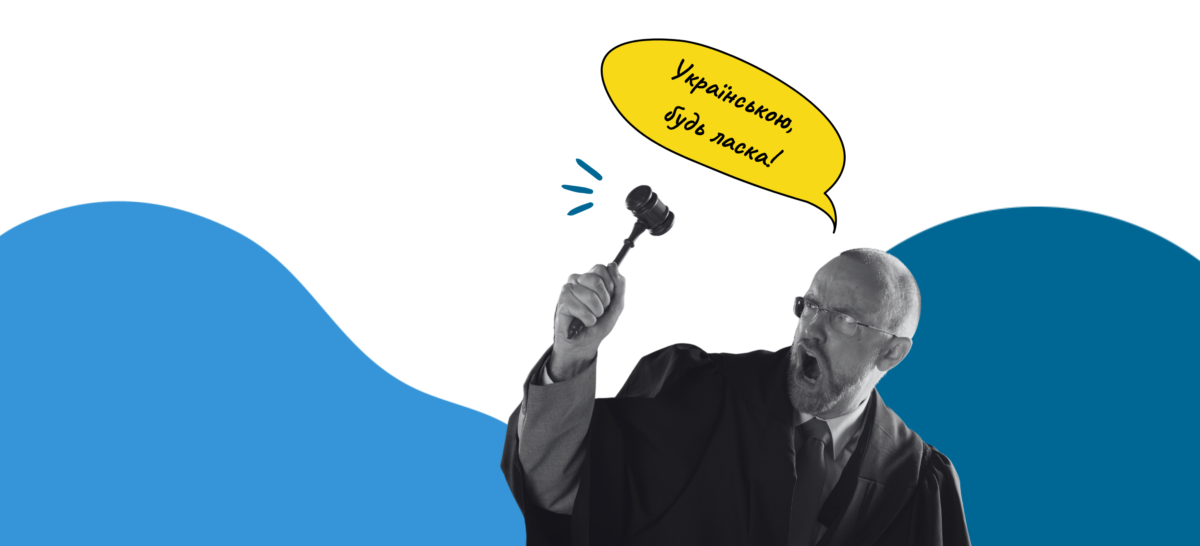

What does the law say?
Ukrainian is the official state language in accordance with the Constitution. It does not prohibit Ukrainians from speaking the languages of national minorities, in particular, Russian. But it is necessary to use Ukrainian or a foreign language in accordance with the laws of Ukraine. In the field of justice, these are: the Criminal Procedural Code, the Law of Ukraine “On Ensuring the Functioning of the Ukrainian Language as the State Language,” the Law of Ukraine “On the Judicial System and Status of Judges.”
Legal proceedings and record keeping in Ukraine must be conducted in Ukrainian in accordance with Article 14 of the law on language. At the same time, it is possible to speak a foreign language in court proceedings, in accordance with the procedure established by the procedural codes and the law “On the Judicial System and Status of Judges.” In other words, judges and prosecutors should make decisions, publish and compose texts, considering the standards of the state language (features of the use of nouns, declension of abbreviations, etc.).
The Criminal Procedural Code also envisages certain features for the suspected or accused foreigners who do not speak Ukrainian. For example, Article 29 of the CPC obliges an investigating judge, court, prosecutor, or investigator to provide them with an interpreter to give evidence, file motions, complaints, or to speak in court in a foreign language.
If a suspect or the accused chooses the option of interpreting, then before starting the work, the investigating judge or court must verify the competence of the interpreter and find out whether they have a private interest. If a suspect or the accused person needs an explanation in sign language, the investigating judge or court may involve a sign language interpreter. By the way, it is the translator who is criminally liable for knowingly incorrect translation or for refusing to translate without valid reasons in accordance with Article 68 of the Criminal Procedural Code.
How is it in practice?
Although court employees and lawyers should only use Ukrainian, they do not always do so. During the monitoring of the work of the High Anti-Corruption Court in April-July 2021, lawyers of Transparency International Ukraine recorded 13 cases of violation of language legislation by lawyers. All of them spoke Russian instead of Ukrainian at court hearings. At the same time, no such violations were found among judges and prosecutors.
In the cases analyzed by TI Ukraine, the lawyers manipulated, referring to Article 10 of the Constitution, to justify the use of Russian instead of Ukrainian. For example, on October 19, 2021, at a hearing on the Ukrkosmos case, the lawyer spoke Russian. The victim’s representative complained that this violated the law on language, but the lawyer believed that this request, on the contrary, violates Article 10 of the Constitution. The court, in turn, asked the lawyer to speak Ukrainian, although there were no actual sanctions for using the Russian language.
Indeed, Article 10 of the Constitution does not prohibit speaking minority languages, in particular Russian, but during criminal proceedings, it is necessary to consider specialized acts (for example, the Criminal Procedural Code) regulating the use of the language. The law on the bar clearly states that the lawyer must speak Ukrainian. The Code of Ethics allows lawyers to communicate with their client in a language that they understand, which can be either Ukrainian or foreign. But the defense party must speak the state language before the court.
Why is it not OK to speak Russian in courts?
The fact is that language is not only a communication tool. Language is one of the most important markers of national identity. It helps people identify who they are. At the global level, the language represents the uniqueness of each country. Given the war with Russia, communicating in Ukrainian means not supporting the position of the Russian Federation. After all, language is one of the key factors that distinguishes us from Russians, and which, unfortunately, is often manipulated in various fields.
It is quite obvious that in everyday life, people can speak different languages — this is a personal choice that should not be forcibly imposed. However, for people holding official positions, speaking Ukrainian is a must.
Judges actually represent the state, passing sentences on its behalf. Therefore, it is their duty to know the Ukrainian language. The same goes for lawyers. They are not officials, but represent a separate structure — the institution of the bar, which has a certain code of ethics. According to it, lawyers must provide services in the state language when applying to the court.
Judges actually represent the state, passing sentences on its behalf. Therefore, it is their duty to know the Ukrainian language. The same goes for lawyers. They are not officials, but represent a separate structure — the institution of the bar, which has a certain code of ethics.






